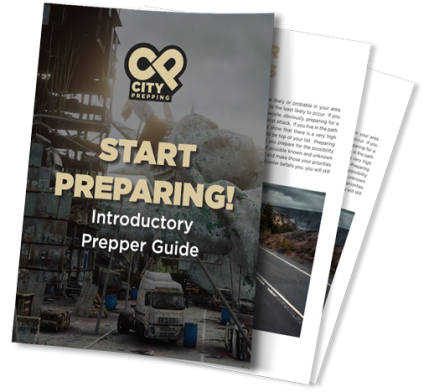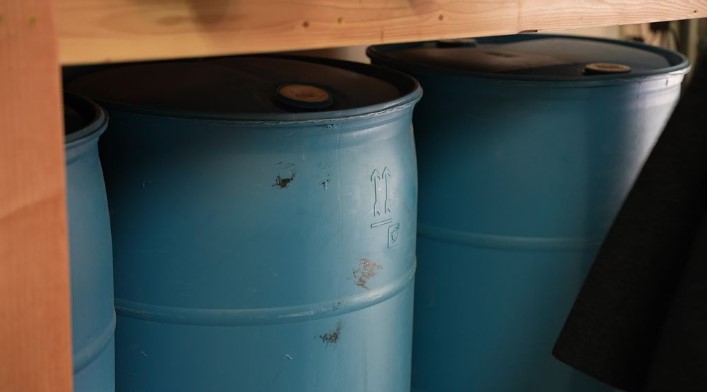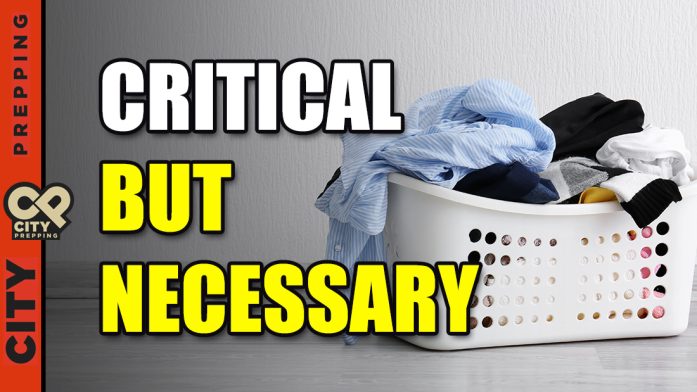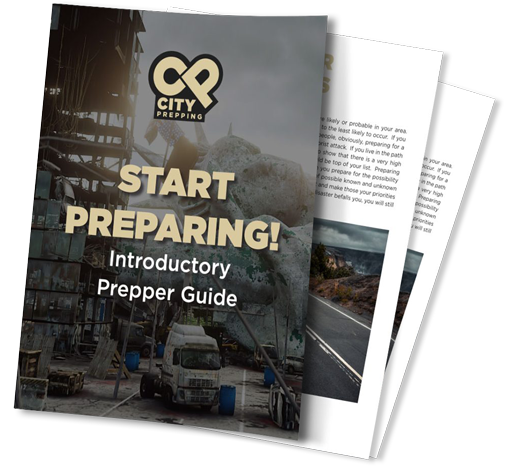 Without water, you’ll be dead in about 3-days. Without food, you would have somewhere between a week and three weeks. Knowing this, we still allow ourselves to rely upon a system that is increasingly subject to failure. Just this year, we have witnessed cyber attacks on our food supply chains that have completely halted food production and distribution. We have seen cyberattacks that have nearly poisoned municipal water supplies. We’ve seen vital fuel pipelines required for distribution shut down and held for ransom. We have seen an entire state, Texas, that if it were its own country would rank 9th largest by GDP, frozen over and powerless, as significant infrastructure systems collapsed under brutal cold. These more minor failures point to the potential of a much larger collapse with our food and water systems.
We take for granted our over-reliance upon a system so finely tuned that we are never more than a single click, a single transaction from getting most anything we can think of. We turn a handle, and the water flows, and we trust that unless it smells funny or tastes weird, it is safe to drink. Yet, you can’t taste lead, Benzene, radiation, or a host of other chemicals and pesticides. If we’re hungry, we go and pick up a burger with a side of fries, but what if that restaurant couldn’t get beef or potatoes? What if the farmer couldn’t get fertilizer because it was too expensive, as we are seeing now, because of the cost of natural gas, and yields of potatoes were smaller?
What if the lack of hearty potatoes, since we only cultivate 200 out of the estimated 4,000 varieties, led to the emergence of a blight that wiped out our supply? It’s happening right now with the banana. Our long-feared over-dependence on one variety, the Cavendish, is vulnerable to a fungus called Panama disease, which is ravaging banana farms across the globe. If it’s not stopped, the Cavendish may go extinct. What if, as we saw with the Walla Walla onion this year, whole crops were wiped out from a once-in-a-lifetime heatwave that seems to be happening more than once in a lifetime? Would you, then, know where to get the beef, potato, or onion for your burger?
The reality is that the systems of water and food have been centralized and fine-tuned. They aren’t built to sustain multiple disruptions. They’re made for large-scale consumption and profit. When disruptions occur, they can cascade into other areas. A lack of corn may easily be dismissed with an “I won’t eat corn for a while.” But what does that same person do when the lack of corn leads to shortages in corn syrup, animal feed, ethanol, and bio-based plastics? Corporate farms aren’t going to simply switch over to growing Amarnath (a·mr·nath), Sorghum, Buckwheat, or Kamut (ka moot) to fill the void. A hundred years ago maybe individual farmers could make the switch and save their year, and the systems of a hundred years ago weren’t as susceptible to systemic collapse for this reason. They weren’t as interwoven as they are today. If the potato crop failed in Idaho, it was alright because you didn’t get your potatoes from Idaho. If the water system in Flint, Michigan was bad, it didn’t matter because you were on your own well and hand-pumped the water you needed. If a meatpacking plant in the Midwest or a styrofoam plant in China shut down, it didn’t matter to our ancestors because their meat was more locally sourced and came wrapped in paper, not styrofoam and plastic.
Food and water supply are a dependence. They’ve grown so centralized and finely tuned that they cannot navigate or circumnavigate some of the turbulence they now face.
2) Energy & Power Production
Without water, you’ll be dead in about 3-days. Without food, you would have somewhere between a week and three weeks. Knowing this, we still allow ourselves to rely upon a system that is increasingly subject to failure. Just this year, we have witnessed cyber attacks on our food supply chains that have completely halted food production and distribution. We have seen cyberattacks that have nearly poisoned municipal water supplies. We’ve seen vital fuel pipelines required for distribution shut down and held for ransom. We have seen an entire state, Texas, that if it were its own country would rank 9th largest by GDP, frozen over and powerless, as significant infrastructure systems collapsed under brutal cold. These more minor failures point to the potential of a much larger collapse with our food and water systems.
We take for granted our over-reliance upon a system so finely tuned that we are never more than a single click, a single transaction from getting most anything we can think of. We turn a handle, and the water flows, and we trust that unless it smells funny or tastes weird, it is safe to drink. Yet, you can’t taste lead, Benzene, radiation, or a host of other chemicals and pesticides. If we’re hungry, we go and pick up a burger with a side of fries, but what if that restaurant couldn’t get beef or potatoes? What if the farmer couldn’t get fertilizer because it was too expensive, as we are seeing now, because of the cost of natural gas, and yields of potatoes were smaller?
What if the lack of hearty potatoes, since we only cultivate 200 out of the estimated 4,000 varieties, led to the emergence of a blight that wiped out our supply? It’s happening right now with the banana. Our long-feared over-dependence on one variety, the Cavendish, is vulnerable to a fungus called Panama disease, which is ravaging banana farms across the globe. If it’s not stopped, the Cavendish may go extinct. What if, as we saw with the Walla Walla onion this year, whole crops were wiped out from a once-in-a-lifetime heatwave that seems to be happening more than once in a lifetime? Would you, then, know where to get the beef, potato, or onion for your burger?
The reality is that the systems of water and food have been centralized and fine-tuned. They aren’t built to sustain multiple disruptions. They’re made for large-scale consumption and profit. When disruptions occur, they can cascade into other areas. A lack of corn may easily be dismissed with an “I won’t eat corn for a while.” But what does that same person do when the lack of corn leads to shortages in corn syrup, animal feed, ethanol, and bio-based plastics? Corporate farms aren’t going to simply switch over to growing Amarnath (a·mr·nath), Sorghum, Buckwheat, or Kamut (ka moot) to fill the void. A hundred years ago maybe individual farmers could make the switch and save their year, and the systems of a hundred years ago weren’t as susceptible to systemic collapse for this reason. They weren’t as interwoven as they are today. If the potato crop failed in Idaho, it was alright because you didn’t get your potatoes from Idaho. If the water system in Flint, Michigan was bad, it didn’t matter because you were on your own well and hand-pumped the water you needed. If a meatpacking plant in the Midwest or a styrofoam plant in China shut down, it didn’t matter to our ancestors because their meat was more locally sourced and came wrapped in paper, not styrofoam and plastic.
Food and water supply are a dependence. They’ve grown so centralized and finely tuned that they cannot navigate or circumnavigate some of the turbulence they now face.
2) Energy & Power Production
 Our energy system is another dependency that is failing before our eyes in real-time. The Texas outage should have been a wake-up call to many that our infrastructure is aging and vulnerable. However, it wasn’t when almost exactly a decade prior, in February 2011, frigid temperatures caused some of the state’s critical power infrastructure, including natural gas wells, to freeze up, cutting off a significant source of electricity and heating for Texans. The cyberattack and ransoming of the Colonial Pipeline should have been a wake-up call to many. When Energy Secretary Jennifer Granholm warned earlier this year that American adversaries have the capability now of shutting down the U.S. power grid, you would think many would have listened and taken personal measures to secure some energy dependence from a system that is failing in real-time.
Our ancestors a hundred years ago didn’t have a power grid or distributed energy. It was common for farms to have a single stationary gas engine that could be purposed for anything from grinding corn to washing clothes. The engine ran on gasoline that was ten cents a gallon and was cooled by steam. Such a thing isn’t very practical today, and it has been replaced by gasoline, natural gas, and solar generators. Still, only about 3% of households have standby generators, and only about 12% have portable ones. The reality is that when the power goes out, we are days from complete chaos and anarchy. At the very least, millions will be desperate to survive.
The never-ending battle between fossil fuels and renewable energy has robbed us all of the promises of both. Absent a greater solution, it’s critical that we, as preppers, address our over-dependence on a power production and infrastructure system that is just one more cut in the death of a thousand cuts.
3) Government Corruption
Our energy system is another dependency that is failing before our eyes in real-time. The Texas outage should have been a wake-up call to many that our infrastructure is aging and vulnerable. However, it wasn’t when almost exactly a decade prior, in February 2011, frigid temperatures caused some of the state’s critical power infrastructure, including natural gas wells, to freeze up, cutting off a significant source of electricity and heating for Texans. The cyberattack and ransoming of the Colonial Pipeline should have been a wake-up call to many. When Energy Secretary Jennifer Granholm warned earlier this year that American adversaries have the capability now of shutting down the U.S. power grid, you would think many would have listened and taken personal measures to secure some energy dependence from a system that is failing in real-time.
Our ancestors a hundred years ago didn’t have a power grid or distributed energy. It was common for farms to have a single stationary gas engine that could be purposed for anything from grinding corn to washing clothes. The engine ran on gasoline that was ten cents a gallon and was cooled by steam. Such a thing isn’t very practical today, and it has been replaced by gasoline, natural gas, and solar generators. Still, only about 3% of households have standby generators, and only about 12% have portable ones. The reality is that when the power goes out, we are days from complete chaos and anarchy. At the very least, millions will be desperate to survive.
The never-ending battle between fossil fuels and renewable energy has robbed us all of the promises of both. Absent a greater solution, it’s critical that we, as preppers, address our over-dependence on a power production and infrastructure system that is just one more cut in the death of a thousand cuts.
3) Government Corruption
 It’s no surprise that government corruption represents both a failing we should see as a sign and a dependency. Many people turn to prepping when they realize the cold reality that the government isn’t likely to be there for them after a disaster. Whether it’s disaster relief held up by congress after hurricane Sandy, or the government’s failings after Katrina, Irma, Harvey, Maria, or countless other hurricanes, many people turn to prepping after realizing the government isn’t in their corner. And government corruption isn’t new. The Crédit Mobilier, Iran-Contra, and the Teapot Dome scandals should have taught us that the best interests of the populous aren’t always the guiding principle of governing. This isn’t just an American problem. It’s a global problem. The China, Bahama, Mossack Fonseca leaks, and the Panama Papers should have been a wake-up call to everyone that government officials put profits well before people.
Somehow on a salary of $174,000, 10% of the senators and representatives each have a net worth of over 10 million dollars. There is no denying there’s some corruption and loopholes there putting personal profit over the people’s interests, but still, we’re massively dependent upon government help. Beyond food stamps and social programs, which really make up a minuscule part– less than 3%– of the budget, we depend on our government to regulate our food safety, maintain and build our roads, rescue us after a disaster, protect us from corrupt businesses and foreign adversaries, and so much more. While our dependence is high, the corruption has been consistent; some would argue that it has worsened. Citizens United has opened up the back pockets of politicians to a flow of corporate, lobbyist, and even foreign government dollars.
So, government corruption is at an all-time high, with politicians governing in the interest of their wealthiest contributors, even if those rich contributors are foreign entities with anti-American intentions. How would you know? The Supreme Court has blocked your ability to find out. Government corruption, our over-reliance on government in our daily lives, and our misplaced trust in government are massive vulnerabilities that seem to be reaching a tipping point in recent years. If the numbers of people distrusting the government reflect this, many are becoming aware of this cut in our death of a thousand cuts.
4) Information Vulnerabilities
It’s no surprise that government corruption represents both a failing we should see as a sign and a dependency. Many people turn to prepping when they realize the cold reality that the government isn’t likely to be there for them after a disaster. Whether it’s disaster relief held up by congress after hurricane Sandy, or the government’s failings after Katrina, Irma, Harvey, Maria, or countless other hurricanes, many people turn to prepping after realizing the government isn’t in their corner. And government corruption isn’t new. The Crédit Mobilier, Iran-Contra, and the Teapot Dome scandals should have taught us that the best interests of the populous aren’t always the guiding principle of governing. This isn’t just an American problem. It’s a global problem. The China, Bahama, Mossack Fonseca leaks, and the Panama Papers should have been a wake-up call to everyone that government officials put profits well before people.
Somehow on a salary of $174,000, 10% of the senators and representatives each have a net worth of over 10 million dollars. There is no denying there’s some corruption and loopholes there putting personal profit over the people’s interests, but still, we’re massively dependent upon government help. Beyond food stamps and social programs, which really make up a minuscule part– less than 3%– of the budget, we depend on our government to regulate our food safety, maintain and build our roads, rescue us after a disaster, protect us from corrupt businesses and foreign adversaries, and so much more. While our dependence is high, the corruption has been consistent; some would argue that it has worsened. Citizens United has opened up the back pockets of politicians to a flow of corporate, lobbyist, and even foreign government dollars.
So, government corruption is at an all-time high, with politicians governing in the interest of their wealthiest contributors, even if those rich contributors are foreign entities with anti-American intentions. How would you know? The Supreme Court has blocked your ability to find out. Government corruption, our over-reliance on government in our daily lives, and our misplaced trust in government are massive vulnerabilities that seem to be reaching a tipping point in recent years. If the numbers of people distrusting the government reflect this, many are becoming aware of this cut in our death of a thousand cuts.
4) Information Vulnerabilities
 Information has been weaponized against us and is destroying us by dividing and propagandizing us. Algorithms feed us according to our biases, regardless of how misinformed those biases may be. The rabbit holes have become black holes that have led many to demonize and dehumanize political opposition and even justify and carry out acts of violence. Pundits have replaced expert analysis with catchy and biting sound bites. At the same time, we are less aware of what is happening in the rest of the world. So many are hard focused on the previously mentioned vulnerability, governments, that they are ignoring their need to tune it all out and focus on their preps. The populace is increasingly more polarized, and this division hasn’t been so apparent since maybe the Gutenberg press and the King James Bible.
Centuries ago, the church controlled everything. Sermons and readings of the bible were in Latin, of which the ordinary person had no comprehension. With the rise of the printing press and an English version of the bible, suddenly, the power shifted from the church to the literate. Many would say that the tectonic shift is occurring again as information gets stratified, divisive, and spoon-fed to us. We probably wouldn’t have cited this as a vulnerability a decade ago, but the internet has driven violent uprisings, riots, mobs, and the rogue actions of some in recent years. The pace of these often violent outcroppings has only accelerated in recent years.
If there were one thing to cite that was likely to lead to a violent insurrection, rebellion, or succession, it would be the echo chamber that is news today. It would be the algorithms on our social media, internet searches, and digital fingerprints that control what we see and feed off our reactions to it– good or bad. Information, true or false, has become a cudgel of foreign governments to divide nations and influence political outcomes. It, too, is one of the many cuts in our death by a thousand cuts.
5) Supply Chain
Information has been weaponized against us and is destroying us by dividing and propagandizing us. Algorithms feed us according to our biases, regardless of how misinformed those biases may be. The rabbit holes have become black holes that have led many to demonize and dehumanize political opposition and even justify and carry out acts of violence. Pundits have replaced expert analysis with catchy and biting sound bites. At the same time, we are less aware of what is happening in the rest of the world. So many are hard focused on the previously mentioned vulnerability, governments, that they are ignoring their need to tune it all out and focus on their preps. The populace is increasingly more polarized, and this division hasn’t been so apparent since maybe the Gutenberg press and the King James Bible.
Centuries ago, the church controlled everything. Sermons and readings of the bible were in Latin, of which the ordinary person had no comprehension. With the rise of the printing press and an English version of the bible, suddenly, the power shifted from the church to the literate. Many would say that the tectonic shift is occurring again as information gets stratified, divisive, and spoon-fed to us. We probably wouldn’t have cited this as a vulnerability a decade ago, but the internet has driven violent uprisings, riots, mobs, and the rogue actions of some in recent years. The pace of these often violent outcroppings has only accelerated in recent years.
If there were one thing to cite that was likely to lead to a violent insurrection, rebellion, or succession, it would be the echo chamber that is news today. It would be the algorithms on our social media, internet searches, and digital fingerprints that control what we see and feed off our reactions to it– good or bad. Information, true or false, has become a cudgel of foreign governments to divide nations and influence political outcomes. It, too, is one of the many cuts in our death by a thousand cuts.
5) Supply Chain
 We don’t make much here anymore, and what we make here often depends on parts and components made overseas. Were we to have another Carrington Event, a solar coronal mass ejection that hits Earth and overloads and burns out the power grid, we would have to rebuild. The same would be true were we to experience an EMP from a hostile country. There’s only one problem with rebuilding, though, most of the components: polymer insulators, suspension end fittings, power transformers, and other specialized bulk power equipment, are manufactured in China, and a large-scale grid collapse would bring deliveries of these components to a grinding halt.
Our over-dependence on a supply chain failing before our eyes became apparent when the Suez canal was blocked by the Ever Given container ship in March of 2021. Even now, we are seeing a shaky supply chain that is suffering from a lack of workers, trucks, containers, chassis, rail cars, and more. Most items you purchase today may have parts made in China, assembled in Mexico, and collectively have seen more miles than you ever will in your lifetime before passing through your home’s door. Even our meat is labeled that it may be from either Canada, Mexico, or the United States. The chicken you bought may have been processed and frozen here, shipped to China and processed further, and then sold back to the United States far from its natural state and many miles removed from its original corporate hatchery in Athens, Louisiana. To say we are overly dependent upon a supply chain that is failing or that it is a global vulnerability that could lead us to devolve from social order and into chaos rapidly would be gross understatements.
For decades, we have out-sourced the dirty work until we have forgotten how to get our own hands dirty. Natural disasters, political tensions, supply and demand imbalances, inflation, and specific and unique shortages of raw materials lead to a supply chain failure like we have never seen before, and we have never been as dependent upon a supply chain as we are now. This, alone, should motivate many to focus on the necessities and cultivate a more Spartan and self-reliant lifestyle.
CONCLUSION
If you don’t have a plan, you become a part of some else’s plan. You can be an observer of these five vulnerabilities we highlight here as they fail again and again until their last wimper, or you can develop your plan to reduce your dependence upon them, increase your self-sufficiency, and implement your prepping plan. We are far too dependent on a system that is vulnerable right now to a more significant cascading collapse. The global infrastructure is not designed to carry and balance its current load, and we have moved away from local sources in favor of profits and convenience. Are these tiny cuts enough to result in what the Chinese call Lingchi– the slow process of lingering death, also referred to as death by a thousand cuts? That remains to be seen.
What we can tell you with certainty is that you can sit on the sidelines and pray, clutching your pearls and wondering why and how things failed so dramatically, or you can build your prepping plan and prepare for the worst to live a better life now. What do you think? Is there a massive vulnerability we have overlooked here or not addressed in the five we have highlighted? Let us know in the comments below. What woke you up to begin to prep? What’s your prepping plan?
As always, stay safe out there.
We don’t make much here anymore, and what we make here often depends on parts and components made overseas. Were we to have another Carrington Event, a solar coronal mass ejection that hits Earth and overloads and burns out the power grid, we would have to rebuild. The same would be true were we to experience an EMP from a hostile country. There’s only one problem with rebuilding, though, most of the components: polymer insulators, suspension end fittings, power transformers, and other specialized bulk power equipment, are manufactured in China, and a large-scale grid collapse would bring deliveries of these components to a grinding halt.
Our over-dependence on a supply chain failing before our eyes became apparent when the Suez canal was blocked by the Ever Given container ship in March of 2021. Even now, we are seeing a shaky supply chain that is suffering from a lack of workers, trucks, containers, chassis, rail cars, and more. Most items you purchase today may have parts made in China, assembled in Mexico, and collectively have seen more miles than you ever will in your lifetime before passing through your home’s door. Even our meat is labeled that it may be from either Canada, Mexico, or the United States. The chicken you bought may have been processed and frozen here, shipped to China and processed further, and then sold back to the United States far from its natural state and many miles removed from its original corporate hatchery in Athens, Louisiana. To say we are overly dependent upon a supply chain that is failing or that it is a global vulnerability that could lead us to devolve from social order and into chaos rapidly would be gross understatements.
For decades, we have out-sourced the dirty work until we have forgotten how to get our own hands dirty. Natural disasters, political tensions, supply and demand imbalances, inflation, and specific and unique shortages of raw materials lead to a supply chain failure like we have never seen before, and we have never been as dependent upon a supply chain as we are now. This, alone, should motivate many to focus on the necessities and cultivate a more Spartan and self-reliant lifestyle.
CONCLUSION
If you don’t have a plan, you become a part of some else’s plan. You can be an observer of these five vulnerabilities we highlight here as they fail again and again until their last wimper, or you can develop your plan to reduce your dependence upon them, increase your self-sufficiency, and implement your prepping plan. We are far too dependent on a system that is vulnerable right now to a more significant cascading collapse. The global infrastructure is not designed to carry and balance its current load, and we have moved away from local sources in favor of profits and convenience. Are these tiny cuts enough to result in what the Chinese call Lingchi– the slow process of lingering death, also referred to as death by a thousand cuts? That remains to be seen.
What we can tell you with certainty is that you can sit on the sidelines and pray, clutching your pearls and wondering why and how things failed so dramatically, or you can build your prepping plan and prepare for the worst to live a better life now. What do you think? Is there a massive vulnerability we have overlooked here or not addressed in the five we have highlighted? Let us know in the comments below. What woke you up to begin to prep? What’s your prepping plan?
As always, stay safe out there. 








